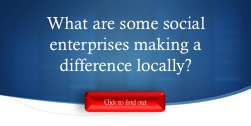Austin's lively entrepreneurial spirit and socially conscious nature cultivate social entrepreneurs with big ideas for our community’s social problems. From tackling animal homelessness to providing job training for people with disabilities, these social enterprises use business methods to achieve what is primarily a social mission.
As more and more of these social businesses emerge, "all signs point to social entrepreneurship really beginning to take hold in Austin," said Nell Edgington, president of the management consulting firm, Social Velocity.
In recent years, she said, there have been some very positive developments to the social entrepreneurship ecosystem such as the addition of a social entrepreneurship program at the University of Texas' RGK Center for Philanthropy and Community Service.
Nonprofits and social enterprises both have direct solutions to social problems at their core, but they differ in their problem-solving approaches. Social enterprises adopt a business model that helps produce financial profits.
"Whether structured as nonprofits or for-profits, according to the Social Enterprise Alliance, social enterprises are simply launched by social entrepreneurs who want to improve the common good and solve a social problem in a new, more lasting and effective way than traditional approaches."
In Austin, social entrepreneurs still face challenges despite the recent local progress. Social entrepreneurs, according to Social Velocity, often deal with a lack of capital, mainly because investors are not familiar with companies that strive for both a financial and social profit. And there are few events that bring investors and social entrepreneurs together in Austin, where there is less understanding of the concept than in cities like San Francisco and Pittsburgh where the social entrepreneurship model is thriving.
But as Austin's social entrepreneurs grapple with these issues, there is also something undeniably unique happening.
"I think what is exciting is the convergence that is occurring between the public, private and nonprofit sectors," Edgington said. "The lines between those three sectors are really starting to blur, not just locally, but globally. And as that happens each sector is borrowing from, and working more closely with, the other sectors to have a much deeper, more positive impact."
Here's a list of some unique local for-profit social enterprises as well nonprofits that are blurring the line and using business models to pursue their mission.
-
Greenling — Co-founder Mason Arnold knew he wanted a business that would make a positive change on the local environment. After working at an environmental consulting firm and seeing first-hand some of man's negative impacts on the Earth, he felt compelled to act. He started with a business focused on organic fertilizers, but then realized that as a social entrepreneur he needed to feel a stronger connection to people and make a bigger impact.
Greenling delivers fresh, organic produce from local farms to an Austinite's door. The revenue that Greenling generates contributes to alleviating several environmental and social problems, such as: fixing the food system by providing customers access to nutritious food, reducing car pollution, and supporting farms that use chemical-free land in order to have sustainable food for generations.
-
Southwest Key Programs — With more than 55 youth-related programs in six states, this national nonprofit (headquartered in Austin), boosts opportunities for young people.
Southwest Key recently completed the construction of its Social Enterprise Complex in East Austin that houses several small businesses, and will create more than 100 permanent jobs. Southwest Keys’ social enterprises, which include food and catering services, property maintenance services, and green building services, help finally support the non-profit’s mission and increase their social impact without relying too heavily on charitable donations and grants.
According to Southwest Key, their social impact has been felt by thousands of youth who have been:
- Diverted from prisons, jails and institutions
- Prevented from dropping out of school
- Reunited immigrant children with their families
-
EmanciPET — Animal homelessness has become a growing social problem in Central Texas. Emancipet tackles those issues by providing a fee-for-service social enterprise approach. Customers purchase low-cost spay/neuter services and affordable wellness clinic care.
In 2008, the Town Lake shelter euthanized 44 percent of animals that entered its doors. Animal advocates say the cost of preventative spaying and neutering is less than the cost of harboring an unwanted pet in city shelters. Emancipet performs between 1200 and 2000 surgeries via both mobile and stationary clinics in the Central Texas area. Free spay/neuter services are also available.
-
Blue Avocado — As more and more US cities ban plastic bags at retail stores, local social entrepreneurs looked into a business that would provide alternative bags for shoppers while reducing their carbon footprint. Blue Avocado does this through education, packaging, and use of recycled materials. The grocery bag system considers insulation for hot/cold items, ventilation for produce and durability for bulk items.
Blue Avocado's revenues help extend their environmental mission of reducing carbon emissions by providing more people with alternative bags that are biodegradable. The social enterprise measures their impact through an eco-impact label they share with their customers on how they reduced their carbon footprint. The label includes information such as the amount of waste avoided by using their bags per trip and annually, and the company’s product carbon footprint from factory to doorstep.
-
Goodwill Industries of Central Texas — Collecting items for Goodwill has become part of American culture in many households. The successful national social enterprise is about more than just cool vintage clothes at bargain prices. It focuses on helping Central Texans find jobs. According to Goodwill, every day they help five Central Texans find a job in the area.
Their popular retail stores provide the revenue to help fund their mission. They work also form partnerships with local agencies that support their vision and help increase their social impact. Locally, they serve thousands of people annually, helping them gain new job skills and lead independent lives.








